Are you an adult child of an alcoholic-angry-dysfunctional parent? There’s hope!

Dear Readers, I asked a friend to write about his experience as an adult child of an alcoholic. What he writes about applies to any relationship with a parent who created a home environment of emotional unpredictability, secrecy, and/or shame.
Hi. I’m Tim and I am the adult child of an alcoholic. This is how you introduce yourself at a meeting of Adult Children of Alcoholics (ACA). If it sounds familiar, it is. ACA is a 12-step program similar to AA, but intended for those who were raised in alcoholic or otherwise dysfunctional families. In my case, my mother was the alcoholic, but possibly more importantly my dad was an emotionally distant workaholic. A lot of his dysfunction was no doubt adaptive behavior from dealing with my mom’s addictions.
The name of the program is significant. It is not just simply that as a child you had an alcoholic parent and now you are an adult. Part of this condition is understanding that because you were inadequately parented as a child, you may be ‘stuck’ in some ways, hence becoming an ‘adult child’. The ACA recovery can apply to anyone who had a childhood where there was anger, neglect, dysfunction, abuse, or other addictions.
Core to the ACA journey to recovery is “Becoming Your Own Loving Parent”. The program encourages that you identify within yourself 4 voices or personas: Loving Inner Parent, Critical Parent, Inner Teen, and Inner Child. Adult children acknowledge that their biological parents were unable to parent in a loving, supportive way that allows for healthy emotional development.
The Loving Inner Parent can provide the acceptance and emotional support that we didn’t receive as children. The Critical Parent is the voice of shame. The Inner Teen and Inner Child represent the voices of various points of our childhood. Because of the dysfunctional parenting we received, there are parts of ourselves that are ‘stuck’ in childhood. The process of self-parenting is intended to heal the inner child and protect us against the Critical Parent.
I have only been following this path to recovery for several months. Like many of these journeys, it began with a crisis. Mine was dealing with crippling anxiety. My anxiety meant that weeks before what should be fun events, I would be so consumed with worrying about possible bad outcomes that by the time the event came, I would just be so glad to be done with it that I could find no joy in it. In seeking therapy, I learned that many ACA deal with anxiety. Our childhood experience of never knowing what family crisis would erupt leaves the impact of always being on guard and hypervigilant.

It is likely obvious that both the trauma of dysfunctional parenting as well as the journey to recovery have spiritual implications. Here are a few that I have found:
- Many of the steps in a 12-step program are about surrendering to pain in search of healing. We can’t begin to heal without accepting the nature of our condition, accepting that our parents failed us in some way, and acknowledging and making amends for our faults. To me, it follows the redemptive healing that Jesus accomplished in surrendering and accepting the suffering of the Cross for us.
- One fundamental lesson of ACA is how to love ourselves. Many adult children were not taught this by their parents due to their own illness. They heard instead that ‘they were in the way’, or possibly that the parent’s addiction was more important to them than their child. Our Loving Inner Parent teaches what the Gospel teaches: we are each worthy of love simply by being a human. In the same way that we can’t earn God’s love (or lose it), we have to be willing and ready to love ourselves. When I am anxious, my Inner Parent reminds me that God loves me, cares for me, and that all will be well.
- There is strength in community. When I hear the stories that other adult children share, I am really struck by the way that so many wounded souls walk among us. Like our faith journey, the path to recovery is an easier one in the company of ‘fellow travelers’. Even those who were not raised in dysfunctional families need to cope with the trauma of original sin. All souls are wounded and in need of compassionate, loving support. We see in both our faith communities and in communities of recovery Jesus’ loving presence in those around us.
The 12-steps traditions have variations of “The Serenity Prayer”. ACA’s version is “God, grant me the serenity to accept the people I cannot change, the strength to change the one I can, and the wisdom to know that one is me.” ACA tend to be overly responsible, wanting to ‘fix’ or ‘save’ anyone in their lives that they sense needs it. This prayer teaches that the only one I can save is myself. With God’s help, I can reparent myself to let the healing begin.
If any of this applies to your childhood, consider attending a meeting. Most are available on-line (thanks, Covid!). They are very easy to quietly attend in order to become familiar with what the program offers. To learn more or find a meeting, see https://adultchildren.org/.
Young people, will you succeed as spouses and parents? (Part II)
(An imaginary conversation between Robert and young adults in college, some churchgoers and some not. In Part I, young people talked about the impact of being raised in divorced families and expressed their desire to avoid divorce in their futures.)
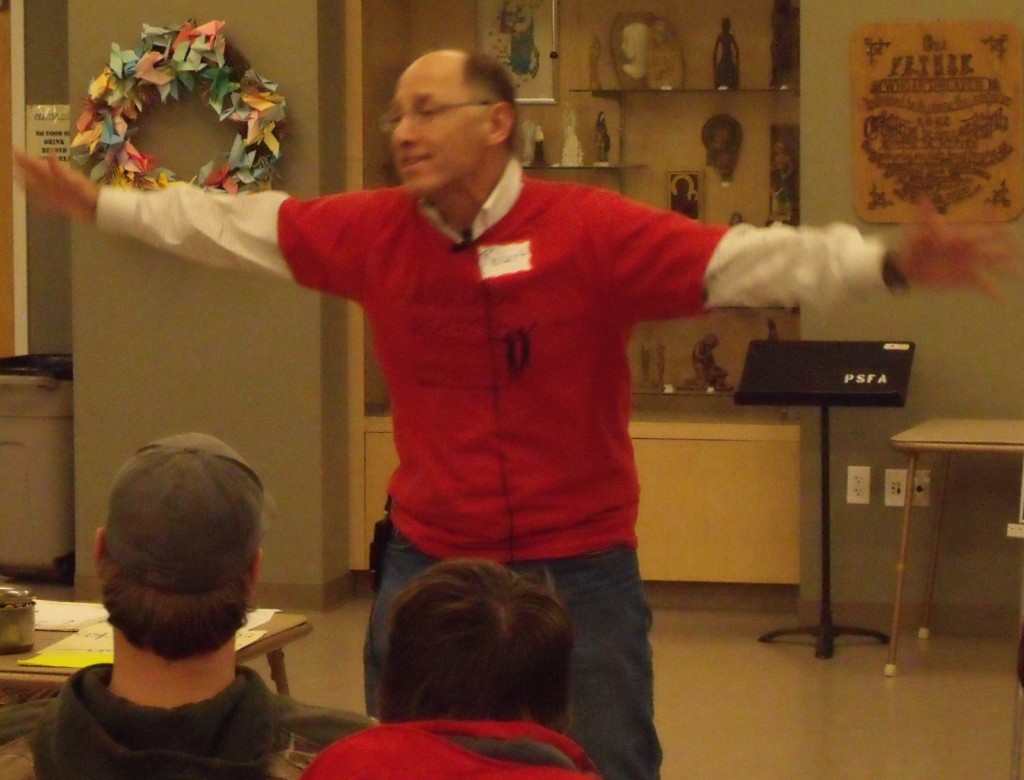
Robert It’s not too late for you to prepare now to be successful later as spouses and parents. Think about it. What preparations can you do now to help you succeed later in love/marriage and as a parent?
YP1 Don’t marry a jerk! (Others yell out, “Yeah, don’t hook up with an a_ _ h_ _ _ !”)
R Amen to that! But keep in mind that your moms and dads did not think the other was a jerk at the time they married. Maybe there were signs of problems that lay ahead that each ignored because they wanted so much to marry and did not want to have an argument.
YP1 My mom told me that she swore as a teenager that she would never marry a drunk like her own dad. But she did. She thought a baby and marriage would change Dad. It didn’t. She did everything to try to get him to sober up and be a good dad. He was a good dad when he was sober.
R Thank you for saying that. There’s so much pain in your story. It’s sad but true: men and women raised in families who struggle with drug or alcohol addiction often marry a partner who has some sort of substance dependency. If your boyfriend or girlfriend has a regular pattern of getting drunk or stoned now, marriage and parenthood are not likely to change that. The same is true if he or she treats you really badly when there’s a conflict – name-calling or a prolonged “silent treatment,” throwing things, etc. Moving in together, buying a house together, having a baby together and/or getting married will not usually change that behavior.
YP2 My girlfriend wasn’t a jerk; we just couldn’t get along after moving in together. She didn’t like how I stayed up late gaming; I didn’t like how messy she was. She didn’t like my work hours, and I didn’t like how she wouldn’t talk to me when she was mad. So, we broke up.
R Too bad you broke up.
YP2 What? How can you say that?
R Well, from what you told me, the two of you were learning some important things about each other. You were learning how different each was from the other. You just didn’t learn how to accommodate your differences so that the relationship could survive and thrive.
YP2 We were like two people playing tug-of-war.

R Many of your parents who divorced probably started growing apart for the same reasons. They were bumping into each other’s differences, which resulted in conflicts that they never learned to resolve. They didn’t have the tools to work through their differences. You see, you and your girlfriend had an unsolvable problem, as does every couple in the universe. You are not your girlfriend, and your girlfriend is not you!
It’s been documented by exhaustive research that 70% of all conflict between a couple has little to do with big moral issues such as, “Are we going to cheat on our income taxes this year?” or, “Shall we trash the neighbors’ yard?” Most conflict between two people in love comes from their having different histories and life experiences, different emotional temperaments and communication skills, and different expectations of the relationship. And when they bump into these differences, they don’t know how to negotiate them and find some common ground so that the relationship wins.
YP3 What do you mean by “the relationship wins?” Doing whatever my partner wants so that we don’t have a conflict? Dad tried that. “Happy wife, happy life,” he would say. That worked for a while. Then a little thing would set him off, and he would explode with anger.
R Great question. Denying my needs in this relationship and giving in to my partner’s is a recipe for my feeling hurt, unimportant, and resentful. For “the relationship to win,” we both have to make our emotional needs clear on any particular issue and work for common ground where we both get something we need. In my own marriage, when my wife and I each learned to say, “I won’t win at your expense, and I won’t let you win at my expense,” we began learning to resolve our differences. The relationship “won” because we were learning to trust that we had each other’s best interests at heart.
Now this may seem a bit odd to you all, but what we really learned was to seek “unity” in all things. By seeking “unity in all things,” in how we spent money, with cooking, work commitments, time together and time apart, we were able to resolve one potential conflict after another. Unity doesn’t mean “uniformity.” I will never be my wife, and she will never be me. After 45 years of marriage, we are still night and day different in many aspects of our personalities.
YP4 That sounds beautiful…and impossible.
R It is beautiful, and it is hard…and it is possible! Think about this. You are training right now to succeed in a particular career or area of work. You are not learning everything you need to know to succeed in these occupations, but you are laying a foundation on which you can build as you grow into your career. Can you also intentionally practice skills now which will help you succeed later in marriage? Since time is almost up, let me give you a list of skills you can develop now to succeed later as spouses and parents.

- Learn to grow in self-awareness. Take time each day learn about yourself, what you like and dislike, and why. Journal your thoughts. Pay attention especially to times when you have been hurt by another or when you have reacted strongly to another. Examine why you responded the way you did.
- Learn to listen to others for understanding. Work at listening without the motives of winning an argument, rebutting the speaker, or proving the speaker wrong. Especially with others with whom you may not have much in common, practice listening for the purpose of understanding. Remember, you can understand someone even if you don’t agree with what he / she is saying.
- Learn to validate another’s emotions. This is part of listening. Look for the emotions/ feelings behind the words. This is important because emotions drive behavior. By naming the feelings that are being expressed, the listener can convey care and a deeper understanding of the speaker.
- Learn to grow in friendship (especially with a romantic partner). Learn to share your likes and dislikes with trusted friends; and listen to their likes and dislikes. Identify how you are similar and dissimilar. Practice finding common ground. (By the way, friendship between spouses is one of the key ingredients for a lifelong successful relationship.)
- Learn to resolve conflict by seeking common ground and unity with another person.
- Learn to forgive and ask for forgiveness. There are no perfect relationships. We do hurt one another despite our best intentions. Sometimes forgiveness is what’s needed to heal and move forward in a relationship.
Lenten 2023 Goal: Doing jigsaw puzzles…really!
By Robert Fontana
Lent challenges me to do what Jesus advised: take the “beam” from my eye before I try taking a “splinter” from someone else’s eye. (Matthew 7:3-5) And this Lent, I’ve decided that jigsaw puzzles are going to help me (and us) do that.
You might ask, “Just how is doing a jigsaw puzzle helping me take “the beam out of my eye?” First, working on a jigsaw puzzle demands paying attention to details (not an easy thing for me). It’s a quieting exercise that requires slowing down and searching for shapes and colors that connect. There is also a beautiful intimacy to it. Lori and I sit next to each other. We help one another out, cheer each other on, and commiserate together when it seems impossible. And then, we continue on, searching for shapes, contours, colors, and little images or markings that will help connect one piece to another.

The slow work of doing a jigsaw puzzle resembles the slow work of taking a “beam” out of my eye. It begins with paying attention to me, to what happens to me while I interact with life, especially with people. I notice my reactions, try to step away from judging others, and examine my responses, emotionally, mentally, and spiritually.
I remember the first time that this happened to me in a big way. Right out of high school, I was doing volunteer work at a Catholic parish on a Navajo Indian Reservation. I had never been west of Dallas, Texas, never knowingly talked with Native people, and was pretty full of myself as a devout Catholic, ready to share the Catholic faith. I was taught, and believed, that Catholicism was the one true Church; and I was ready to tell others about it.
Arriving at the parish, I discovered that we Catholics were only one of many Christian churches competing “to help” the Navajo people. I saw an Olympic-type competition among the many denominations to draw the Navajo children to THEIR vacation Bible school. Driving our van to pick up children, I was on high alert dodging the other church vans doing the same thing. Pentecostals, Lutherans, Presbyterians, Jehovah Witnesses, Mormons, and other non-denominational groups. Though I did not quite know what it meant or how to articulate it, it felt a bit obscene to me. I did not see that I had a “beam” in my eye that needed to be taken out.
Our parish volunteer ministry team decided to do door-to-door evangelization. We practiced how to give our 4-minute evangelization spiel and set out. At one adobe home, before I could begin my spiel, a Navajo woman held up her hand and said, “Stop! Why don’t you listen to me before you open your mouth.” She followed with, “We’ve been do-good to death.”
I don’t remember the rest of our conversation clearly, but I do remember being shaken by her words. It was the beginning of my coming to realize that I had a “beam in my eye” that needed removing. But the work was slow. First, like the jigsaw puzzle, I began connecting the shapes – all the Christian churches competing for the Native children’s participation, including we Catholics – we were all “do-gooders.” The words “do-gooder” did not feel good. What did it mean? At the time, I pondered, but did not ask someone older and wiser than I.

It was not until much later that the Navajo woman’s words, “We’ve been do-good to death,” and “Why don’t you listen to me before you open your mouth?” began to really bother me. I hadn’t really listened to her. I had so much to say. Sadly, I started doing youth ministry a few years later with the same “do-gooder” beam in my eye. I had so much to say to young people and gave the most god-awful retreats. The saving grace was that we had fun, ate well, and there were good, caring people working with me. But again, I talked at the young people and did not listen to them because I had a “beam in my eye” and did not know it.
Fast forward to graduate school, youth ministry training and learning a Catholic theology of grace: that all of creation, though wounded by sin, is imbued with the presence of God. God is fully active in the lives of every human being, regardless of race, creed, or color. If this is true, then every person deserves to be respected and heard. And, if this is true, then the method of evangelization cannot be a “monologue” which is what I was doing with the Navajo woman and my first youth group. We needed a dialogue that began with my listening to them, learning their stories, and building trust and friendship before I shared my story.
Finally, after years of looking at the shapes, colors, and contours of my encounter with that Navajo woman, I was able to name the “beam in my eye” and remove it by learning to listen to others whose world views and experiences were completely different from mine. This has been the story of my spiritual journey since, taking the beam out of my eye, as I learned to…
~ be a humble Catholic Christian;
~ be a healthy spouse to Lori and loving father to our children;
~ work with women in ministry;
~ struggle with being raised on the white side of segregation and flying a Confederate flag;
~ listen to and honor the stories of my gay family members and friends;
~ willingly encounter believers from Islam, Judaism, Buddhism, and Native American religious faiths;
¨ and…you get the message.

During Lent I am working on a jigsaw puzzle to help me slow down and pay attention to the jigsaw puzzle of my life. What beam needs to be removed from my eye this Lent? I’m not sure, but I’m expecting the Holy Spirit to show me one piece, one shape, one color at a time.
Tupperware Lids and Why I Need Lent
By Lori Fontana

What a problem! I find the perfect container for the leftover soup, pour the soup in, and then… no lid that fits. YIKES! So I start my search again. It’s annoying.
Periodically, I lay out all our food containers, pull out all the lids, and match them up. Then I toss any container or lid that doesn’t have its corresponding part. But things never seem to stay matched for long.
On Ash Wednesday, I was whining, “Where is a lid that fits this?” as I tried to snap on several “similar” but wrong lids. I caught myself – what am I complaining about? Do I really think THIS is a problem?
Our world is experiencing so much suffering, near and far: the brutal war in Ukraine; the terrible devastation from the earthquakes in Syria and Turkey; hunger, disease, and drought in so many places – Yemen, Afghanistan, North Korea, Nicaragua, Haiti. Closer to home, in Seatac, a mom with three children struggles to feed them and scrounges for diapers for her baby. Wouldn’t she just laugh (or scoff) at my so-called problem – a container missing its lid!
The ancient Ash Wednesday prayer, prayed as my forehead is marked with the cross of ashes, calls me up short: “Remember, woman / man, that you are dust, and unto dust you shall return.” What’s a missing Tupperware lid in light of this prayer?
This is why I need Lent. I need Lent’s invitation to pause, to reflect on my own life, and to, symbolically at least, go into the desert with Jesus, where there is time for quiet prayer to listen to the wisdom of the Holy Spirit. Lent is a time to see more clearly some basic truths: my mortality and the gift of my faith.

Lent calls me to lift my eyes from life’s small irritations and really look around to see the afflictions of so many. But once I see, how do I respond? With reflection, two things are clear to me. First, my problems are so very small; and second, I don’t have the power, nor is it even my job, to relieve all the world’s misery.
In regard to the truth of small problems, I know that, yes, I can whine less! But I still need a lid that fits…How, then, do we followers of Jesus deal with our everyday annoyances? Is it okay to complain sometimes? Frustration is a normal human response. The challenge for Christians is to move through the complaints and self-pity.
Lent is a reminder that, though we will be impatient or tired, misunderstood or inconvenienced, mad, sad or scared, we can’t wallow for long in these feelings. Why should a missing Tupperware lid rob me of peace! Spiraling into the mire of “poor me” is not what Jesus asks of us as people of faith. Jesus promises us, “Peace I leave with you; my peace do I give to you. Not as the world gives do I give it to you. Do not let your hearts be troubled or afraid.” (John 14:27)
One simple and sure way to pull out of the mire of self-pity is a grateful heart. Another is to “offer it up,” as so many of us were taught by our mothers or fathers or Catholic school teachers. Both gratitude and “offering up” work a conversion in me. I can turn my thoughts outward toward the deep suffering of so many people. Spiritual writers exhort us to pray, joining our suffering, great or small, to the suffering of Jesus, who embraces the suffering of all.
As to how one addresses the suffering around the world: no one person can relieve the world’s suffering. What can I do? I firmly believe each of us can be good, do good, be a power for good in the circumstances of our daily lives. Some are called to far-away mission work; most of us are not. But each of us lives in “mission territory,” where people are suffering, where the love and hope and JOY of the Trinity are sorely needed. We can be messengers of Jesus’s love, hope, compassion, JOY. After all, as St Teresa of Avila says, we are the hands and feet, heart and voice of Christ now on earth. Every little act of kindness furthers the reign of God.
What does this look like? For me, it’s showing patience in the doctor’s office or waiting in the phone queue. It’s a smile and hello to someone in need on the street. It’s asking the grocery clerk how her day is going, and really listening to her answer. I’ve had quite the conversations while buying milk and eggs! It’s compassion and kindness to those closest to us, in our homes, our work places, our neighborhoods. And a belief that is really opening up my heart to be more loving is that most people are doing the best that they can.
The Scriptures of Holy Week lead us through Jesus’s passion and death. What great love Jesus shows for us in both his life and his death. There is no greater love, and Jesus gives his love to us freely and completely. In the end, love is what matters most. I pray our hearts will overflow with gratitude for this gift of Lent, which helps us grow in our love for Jesus and one another.
Now if I can just find that darn lid…
Imagine being married to yourself!
By Robert Fontana
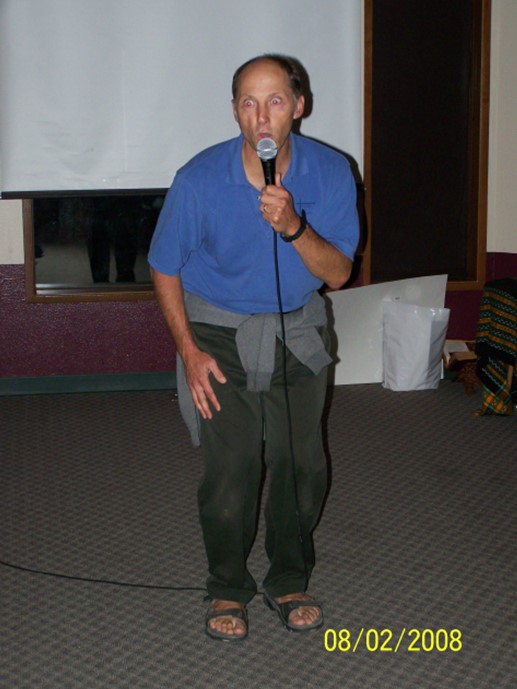
I know! It sounds like a nightmare! However, after being married for 45 years this August, and having now worked for many years as a therapist for couples, married and co-habiting, it is my experience that most spouses and partners would, at one time or another, say they would prefer to be married/partnered to oneself. This actually happened to Lori and me.
We were going through some conflict, nothing major mind you. I was working hard to be a good listener. It was a little challenging since I was standing outside in the howling winds of a snowstorm, the door double-locked, and Lori talking to me from the other side. Those details are unimportant. What’s important is that we were eventually able to sit down and talk. We each wrote down what we needed from the other.
Lori’s list was (and I am not making this up):
Þ When you say you’ll be home at 10 pm, Mr. Youth Minister, you’re home at 10 pm.
Þ When you come home at 10 pm, you do not wake the small children to play with them.
Þ If there are mounds of diapers to be folded and dishes to be washed, there is NO ROMANCE!
Þ If you write a check, record a check.
Þ If you record a check, record it correctly.
Þ If you balance the checkbook…JUST DON’T!!
My list was much shorter:
Þ Don’t sweat the small stuff. (Remember the book of the same name?)
Þ Let’s be flexible.
Þ Let’s play more.
Þ The dishes and diapers can wait…
We each read our list to the other and then started to laugh. Basically, Lori was saying she would prefer to be married to her, and I was saying that I would prefer being married to me. At that point, I heard a voice in my head, and I’m sure it was the Holy Spirit, say: “Now real love can happen in this marriage.” We knew right away what the voice meant. We really needed to accept each other as the other is. And if our needs are not being met, we had to learn how to communicate this to one another and negotiate to get to some common ground so that the marriage would always win. We had to stop the tug-of-war of “I’m not you, and you’re not me,” of pulling against one another; and we needed to do the hard work of pulling together by finding unity in all things.
John Gottman, a University of Washington researcher on love and marriage, wrote in his book, The Seven Principles for Making Marriage Work, that 69% of the conflicts between couples have nothing to do with “right or wrong.” They have everything to do with “I’m not you, and you are not me.” Couples who never learn this truth, remain in a tug-of-war, pulling against each other, until divorce or “death-do-they-part.” They convince themselves that their issues are really about “right or wrong;” but in truth, it’s mostly about “this is what I want, how I like it, how I was raised.”
This tug-of-war marriage leaves one or both spouses feeling hurt, dismissed, and unloved. I have clients who are devout Christians, who have been married for 25, 30, or 40 years, and yet they are miserable in marriage. If their faith helps them at all, it is only to bear the cross of the other; it doesn’t seem to help them find unity, love, and friendship. Rather than learning to accommodate their differences and work for unity, these couples create a negative pattern or “dance” of interaction that they step into anytime they have a disagreement or conflict. Their negative dance reinforces the hurt, distance, and disconnection.
Successful couples learn that this tug-of-war must end. They learn through conflict that they are bumping into their differences. What is needed is effective listening to understand the other, and empathy to validate one another’s emotions. Healthy couples learn to say to one another, “I won’t let you win at my expense, and I won’t try to win at your expense. We are going to find common ground so that the marriage wins.”
Through different issues that have surfaced in our marriage, Lori and I have learned to desire unity over what each of us may prefer. This ranges from simple issues like how we are going to spend our evenings to complex issues like navigating a difficult topic within the family. We are motivated to find unity with whatever the current issue is because tomorrow there will be another issue…and the next day another one. Working for unity day-in and day-out creates a positive pattern or “dance” that reinforces love, friendship, emotional safety, and belonging. After almost 45 years of marriage, we go to bed at night with a profound sense of peace. We don’t have a perfect marriage, but we do have a successful one. Are there times when we don’t quite find unity on an issue, when we misunderstand one another and have hurt one another? Absolutely! But because of the positive dance we have created in our relationship, we are quick to repair, talk things through, learn from our mistakes, and forgive one another.
Unity does not mean uniformity. After all these years, we are still night and day different from one another. On our day off, Lori would prefer to begin it with a cup of coffee, time for prayer followed by time to work the crossword puzzle in the paper. I prefer to begin my day, after coffee, with a long quiet walk in the park. So we compromise, with coffee and prayer together, then her crossword puzzle, my walk. Seeking unity in all things means we strive for agreement on an issue. It also means that one or both of us might say, “I don’t like this decision, but I can live with it without resentment.” And the positive dance goes on!
I would hate to be married to me. Being married to Lori is way better!
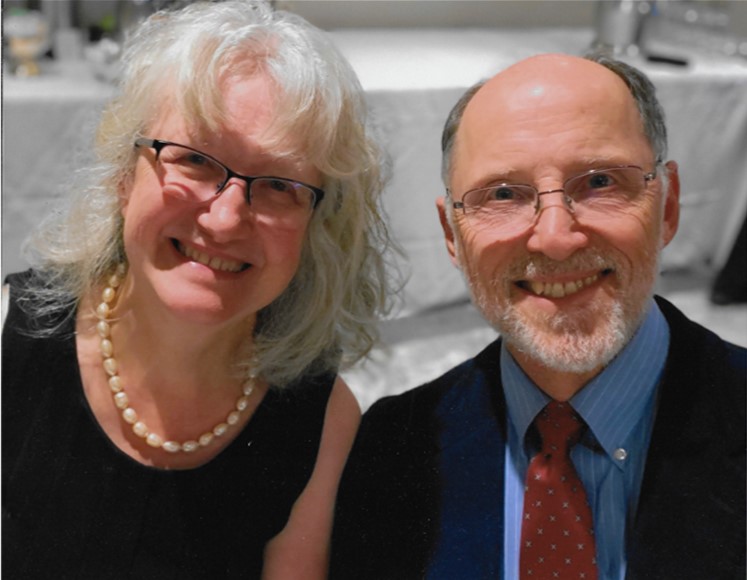
Care for the Earth Poetry and Essay Contest for Youth, Kinder through High School

Lori and I are helping our parish (Assumption Parish, Seattle) celebrate “Present Your Child to God Sunday” on February 19 (changed from Feb 5). We are going to have a grand procession with children ringing bells and waving streamers, and a trumpet player leading the pack playing “O When The Saints Go Marching In.” It ought to be fun.
In addition, we are trying to involve the youth and children in a meaningful way through an essay / poetry contest at the parish. The topic we have chosen is a real life issue, close to the heart of Pope Francis, “Care for the Earth.”
Our children are the Church of today (and not merely of the future). We can start treating them as such by asking them to think about and act on real issues that are critical to human survival like climate change and care for God’s creation.
CLM is hosting a separate poetry/essay contest for our readers and sponsors who do not attend Assumption. We invite you to ask your children or grandchildren to participate in the essay/poetry contest (CLM entries will be judged separately.) Begin by showing them a short (4-minute) video made for children, about Laudato Si, Pope Francis’ encyclical letter.
Go to https://www.youtube.com/watch?v=KOgF2Kgel6k Then children can submit a poem or a 100-word essay on “what it means for you to ‘care for the earth’ during this time of climate crisis.
I showed this video to my grandchildren. Following it, they immediately set to work on writing something:
This is what 3rd-grader Cora wrote: Save the Earth – The earth is a beautiful place full of life but humans are taking more than they need. All things need earth and they matter just much as you. You can help the earth. You can bring back the beauty. You can make a difference. You are special. So, bring back the lush green forest. Bring back the sparkling waters and peaceful animals. Bring back earth. Plant a garden. Feed the birds.
And 1st-grader, Rose: The Earth – Trees, flowers. All things are beautiful. Everyone matters. You matter. We have light in the darkness. We can make the earth better.
3rd-grader, Linus wrote a haiku: Caring for the Earth – Be kind to the earth. Just do it! Do it! Do it! Give back to the earth.
Your youth and/or children can win prizes (they won’t be competing with the Fontana grands).
First place: $25 Second Place: $15 Third place: $10
So please sit down with them, show them the video, and encourage them to write a poem or essay on “Care for the Earth.” Scan and email the essay or poem – one entry per person – to robert@catholiclifeministries.org. Or mail it to us: 1827 NE 58th St, #B Seattle WA 98105. Due by Saturday, Feb 18th. We will select winners for the following age groups:
High School (9th – 12th grade); Middle School (6th – 8th grade); Primary School (Kinder – 5th grade). Please be sure to write the author’s name, grade level, and phone or email on the entry.

St. Brigid’s Day (Feb 1), Ash Wednesday, and Other Non-Essentials of the Christian Life

A person could go all his or her life without observing Ash Wednesday and still be a deeply committed Christian. Obviously the same is true for St. Brigid’s Day. These celebrations include some tangible expression of faith. On Ash Wednesday we receive a cross of ashes on our foreheads. On the eve of St. Brigid’s Day (February 1), we use a kerchief to literally swipe our homes clean of sin with the cloth and then tie the cloth to a tree, where “Spirit-wind” blows the sins away. These actions add meaning and even fun to our faith, and help make our faith very real and earthy. They are outward signs of our beliefs as disciples of Jesus, yet they are not essential to discipleship.
What are the essentials of being a disciple of Jesus anyway? Here are a few that come to mind: belonging to a community of faith that follows Jesus; encountering Jesus in a personal way and making a conscious decision to follow him by living out the Beatitudes; opening one’s life to the Holy Spirit; belonging to a small group where one is personally loved and held accountable as a disciple; participation in public worship and community rites; maintaining a consistent prayer life that involves the praying with/studying of Scripture; engaging one’s faith within daily life; caring for the sick, elderly, poor, and for children.

WOW! That’s a tall order and sounds like a lot of work. These “essentials” are the “meat and potatoes” of following Jesus but, to continue the food analogy, without much seasoning or dessert.
I think that it’s the addition of the non-essentials that adds spice and fun to one’s faith, and shapes a specific identity as Christians (Catholic, Episcopalian, etc.). For example, the liturgical year that divides up secular time into sacred seasons of Advent/Christmas, Lent, Easter/Pentecost, and Ordinary Times, is certainly not an essential feature of being a Christian. Some deeply Christian denominations function perfectly fine without a “liturgical year.” Yet we Catholics, joined by the Orthodox and mainline Protestants, find the liturgical calendar extremely useful to organize the year around the major themes of Jesus’ life, death, and resurrection. In doing so, we think we are better able to fully participate in that paschal mystery year round.
We wait with patience during Advent as we pray for the coming Messiah; rejoice exceedingly as we celebrate the coming of the Messiah in the baby Jesus during Christmas/Epiphany; sit at the feet of Jesus during Ordinary Time to learn about the Kingdom of God; mourn with Jesus for our sins and the sins of the world as we walk with him to Calvary; and shout “Alleluia” as we experience his resurrection and the gift of the Holy Spirit. The liturgical year is a non-essential aspect of Christian discipleship that infuses our faith with the breadth of human emotions. It adds immense depth to Christian discipleship and provides us with an anchor to hang on to our faith amidst the busyness of secular society.
The “Sign of the Cross” is another non-essential and arbitrary practice that Christians do that has helped shape an identity that is deeply Christian and Catholic. In that one action, we remind ourselves of the saving work of Jesus through his death on the cross, and of our dependence on the Trinity, Father, Son, and Holy Spirit. Can a person be a good Christian and never make the “sign of the cross”? Most certainly. Some Christians bow their heads when they begin a prayer. Catholics (and Orthodox) make the “Sign of the Cross.” It reminds us to quiet ourselves and be attentive to what God is doing in the moment, whether it is followed by the blessing of a meal or the committal of a beloved family member to the grave.
I think a relationship with Mary, the mother of Jesus, especially manifested through the practice of praying the rosary and the veneration of her image in ICONS, is a non-essential practice of Christian discipleship. One could go his or her entire life without ever praying to God through Mary, much less saying the rosary, and still be a deeply committed follower of Jesus. St. Paul makes no mention of Jesus’ mother except in one obscure text in Galatians (4:4). Certainly Paul never prayed to Mary and never thought that what she brought to the life of a disciple was important enough to write about. Protestants, taking their cue from Paul, also do not pray to Mary (or the saints) and yet are still following Jesus as committed disciples. Mary, ICONS, and the rosary are non-essentials to Christian discipleship. Yet Christians have prayed to God through Mary since the early days of Christianity. Devotion to Mary, so deeply imbedded in Catholic and Orthodox cultures, is a wonderful gift from God that deepens faith, hope, and love.
Of course, there are many other non-essentials such as observing the feast days of saints, praying to St. Anthony for lost items, blessing pets on the feast of St. Francis, wearing religious medals and scapulars, lighting candles as a prayer offering, fasting on Wednesdays and Fridays, and “burying the Alleluia” on Mardi Gras, the Tuesday before Ash Wednesday. None of these practices are essential to Christian discipleship and, if done without the essentials, don’t have much meaning. But when these rituals are done in conjunction with being an active follower of Jesus, they have the capacity to shape a Catholic Christian identity that gives a person deeper roots and brings joy and fun to the Christian life.
So add some spice to your faith life. On St. Brigid’s Day (Feb. 1), wipe your home clean of sin and on Mardi Gras (Feb. 21)) bury the Alleluia (see rituals below). Then on Ash Wednesday, the very next day, go to the nearest Catholic Church and get your ashes (even if you are not a Catholic).
_______________________________________

For the Eve of St. Brigid’s Day “Spring Cleaning” (January 31)
Prayer: Saint Brigid, daughter of Ireland and lover of Jesus, draw us by your prayers into the living flame of God’s love. Help us to clean our hearts and homes of all that is selfish and self-centered. We forgive all who have hurt us and ask God to forgive our sins as well.
Pray for us, St. Brigid, that we will be attentive to the poor and spiritually abandoned, that we will practice the Beatitudes in good times and bad, and that the warmth of God’s love will animate all that we say and do.
Activity: Each member of the home takes a kerchief or handkerchief in hand and walks through the house dusting the furniture and books, lamps, etc. singing “Alleluia, alleluia, alleluia.”
When the house has been thoroughly dusted, all go outside and tie the kerchiefs on the branches of a tree. The myth is that, on the eve of her feast day, in the grace of God and the power of the Holy Spirit, St. Brigid travels through the land with her prayers to remove the dust and sin, and even ailments, from our lives.
Closing Prayer: St. Brigid, come this day, to our home and hearts, come by the power of God, and be our guest. And help us, dear Brigid, to wipe away the dust of “me, my, and mine” that we might love others as disciples of Jesus with a selfless heart. Amen.
Our Father…
Leave the kerchiefs and handkerchiefs on the tree for a week or until Ash Wednesday.
BURY THE ALLELUIA ON ASH WEDNESDAY (Feb 22) or on the Eve of Ash Wednesday (Mardi Gras)
All Alleluia! Alleluia! Alleluia!
Leader For the 40 days of Lent, the Church “buries the Alleluia” by refraining from singing this sacred word in our liturgy. We do so to remember the Lord Jesus, God’s alleluia, the Lamb of God, who took the sins of the world with him to the grave so as to rob them of their power to destroy life.
What are the sins of the world today that destroy life? Say them aloud as you write them on a sheet of paper bearing the word “Alleluia.”
[After all have written the “sins of the world” on the sheet, the “Alleluia” is placed in the ground and buried with dirt in the same way that Jesus who died for the sins of the world was buried in a tomb following his death.]
All Gracious God and Father, your beloved Son Jesus suffered death to give us life. Help us during this Lenten season to deny ourselves and serve others in imitation of Him who lives with you, and the Holy Spirit, one God forever and ever. Amen!
Homespun Homily: On Holy, Vulnerable Ground
By Lori Fontana
How many of you, dear readers, have cared for a loved one who is very ill? I am in the midst of caring for a family member who has suffered a debilitating illness, and it has given me much time to ponder and pray. Seeing her so debilitated is heartbreaking, but it is also breaking my heart open to many truths that I believe God wants to teach me.

My journey to care for my loved one was long and winding, both figuratively and literally. Literally, I had to work feverishly to “clear my calendar” to make the time and space to come. Though I only work part-time (for Robert! – I’m chief cook and bottle-washer, or rather, bookkeeper, event planner, and of course, sometime writer!), most of my work cannot be done remotely. So there was a long “to-do” list to complete before I traveled.
The trip itself was long – across the country; and while I am always amazed at the speed of air travel, gosh those airplane seats are smaller and smaller, and even on a flight of 3,000 miles, all you get for sustenance is a bag of pretzels and some cold water or hot coffee. And don’t get me started on the airplane restrooms…aghhh!
The figurative journey was an interior one – mental and emotional. Before coming, I worried and fretted: would I be physically strong enough to give the needed help? How would we pass the time – the many hours over many days of just being present to each other? Would we be relaxed and comfortable, or tense and uncertain? Would the family like my cooking?
Thankfully, I pushed through the hesitancy and doubt…and here I am. And what a tremendous grace it has been.
On my first day here, I was helping to give my loved one a sponge bath. I’ve given thousands of baths to my babies and toddlers but never to someone near my own age. I was overcome with such a feeling of tenderness and a sense of the holiness of the moment – ministering to someone who is so in need of help and vulnerable. I am aware of my role as caregiver, yes, but in a flash of clarity, I understood that I, too, share in her very same vulnerability and fragility, because I am human. None of us is beyond the reach of illness or accident or aging; and we are all going to die.
Coming face-to-face with this basic truth, I know I have several choices. I can run – to activities, media, fun; I can hide – behind clothes, possessions, obsessive exercise; I can deny – with food, drink, drugs, unhealthy relationships. Or I can embrace the end to which all of us are heading.
It’s just a fact that when we are certain about where we are going, we are better travelers. We move forward with intention, with gusto and JOY, because in the light of eternity, we can see more clearly what really matters. Oh, we can count on making detours. Sometimes we will circle back or veer into dead ends, even with our clearer vision. But we will stay on course to our eternal home, following God’s beckoning, God who is pure love and who loves us completely, totally, without reservation.
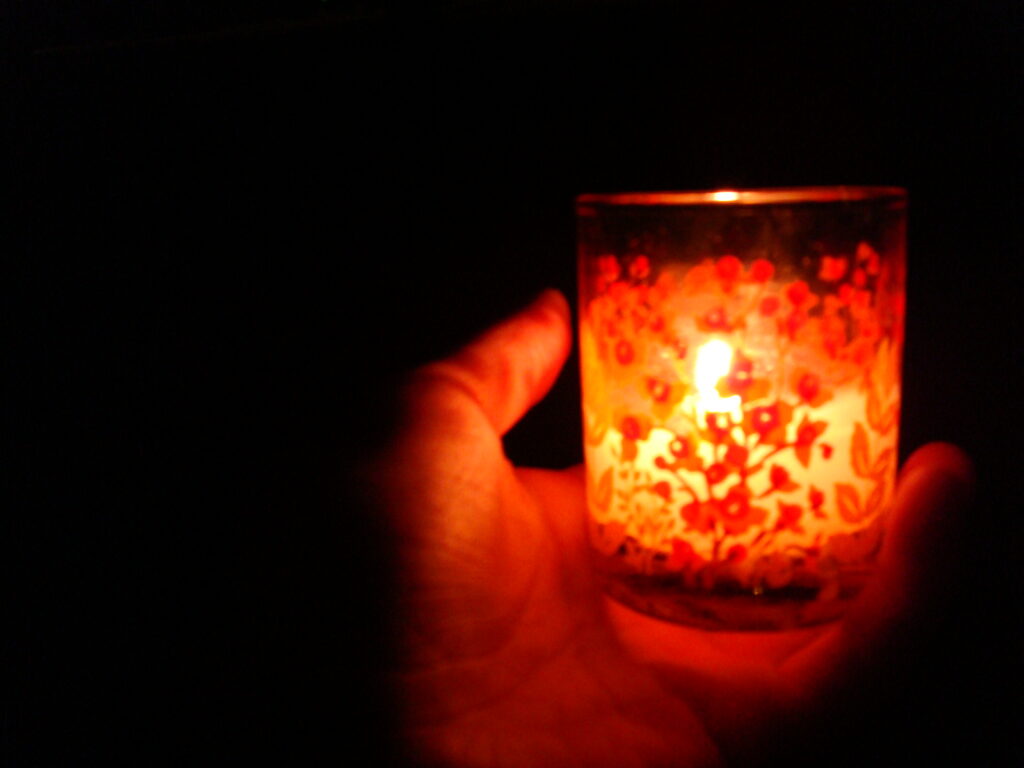
Yes, God loves us, but that doesn’t mean we won’t suffer, which points me back to the grace of caring for my loved one. Overnight, much of who she is had seemed to vanish. She can walk only with help; she cannot cook, drive, or write. Individual words are clearly spoken, but her thoughts are often jumbled, especially with the mixing up of “I,” “you,” “she,” “me,” etc. The mystery is that, no matter her physical, mental, emotional state, truly, she is beloved of God. As the Lord tells us in Isaiah 43:4, ”You are precious in my eyes, and glorious [honored], and I love you.” No one is excluded from God’s love.
As I tend to my loved one’s needs, I am so aware that I stand on holy ground and am called to a holy mission. As John Michael Talbot sings, “Christ has no body now but yours, no hands, no feet on earth but yours. Yours are the eyes through which he moves compassion on this world; Christ has no body now on earth but yours.” [from St Teresa of Avila]
I’ve never had this role before. Helping to feed, dress, toilet, and bathe another adult is a very intimate, and sometimes very intimidating, job. But with the eyes of faith, it becomes a sacred duty, an honored task, and an act of love. In this hard and holy work, the Holy Spirit is revealing to me my smallness, my weakness, and also my greatness. I, human, am diminishing each day; but also I, human, am Jesus to another. This is holy ground, indeed!
I’m left with two things to ponder. First, I will be leaving. I will travel to an airport, get on an airplane, and fly across the country, returning to my own daily routine, my own bed. I’m basically in control of my life. I leave these hardships behind, but my loved one remains here, struggling each day to do the most basic life activities such as brushing her teeth. How often do I brush my teeth mindlessly, while doing two or three other things?!
Second, I’m reflecting on the many, many people who cope with a loved one’s debilitating illness every day, for long weeks and months, even years. It can happen in any of our families or circle of close friends. And, taking it a step further, the one with the debilitating accident or illness could be me.
It’s only in faith that I can stave off the anxieties and fears that accompany thoughts of these possibilities. Jesus is our hope; he knows firsthand our human journey, has endured many trials and sufferings, and promises to be with us “in good times and in bad.” And he also gives us the Holy Spirit to strengthen and guide us. That is the power of our faith – not that we avoid all troubles, but that we are given the power and the wisdom to endure them.
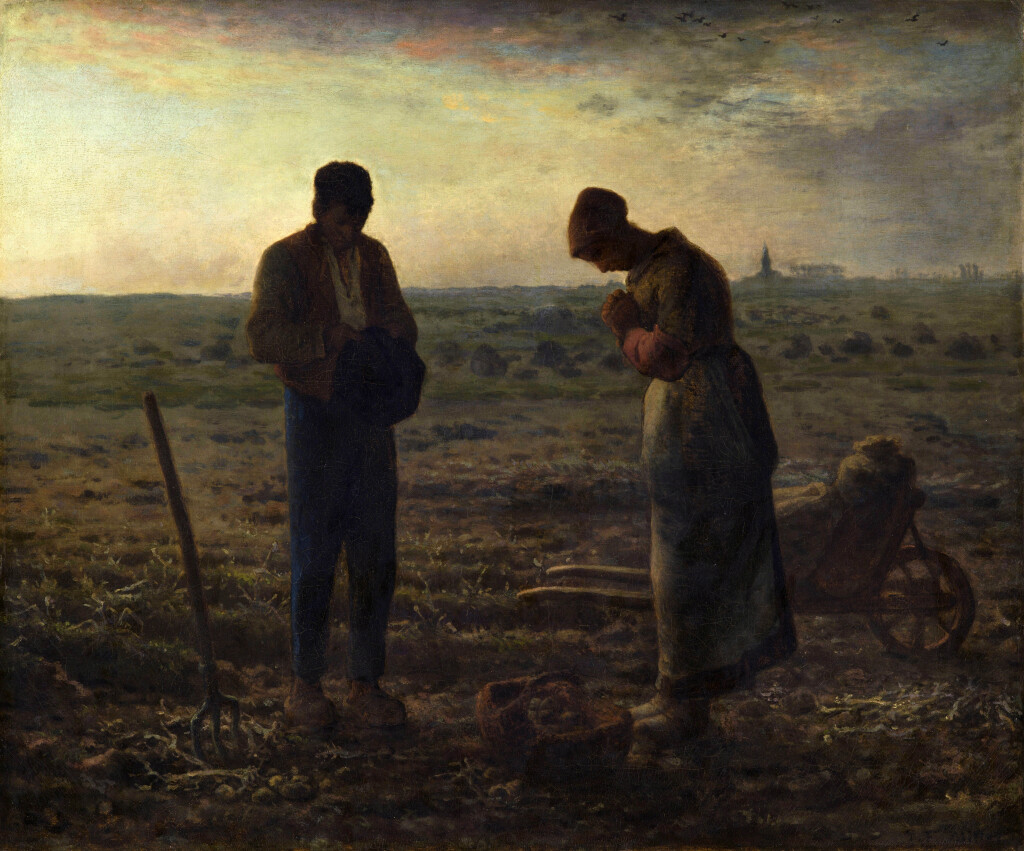
February 5 is “Present the Children to God Sunday!”
By Robert Fontana
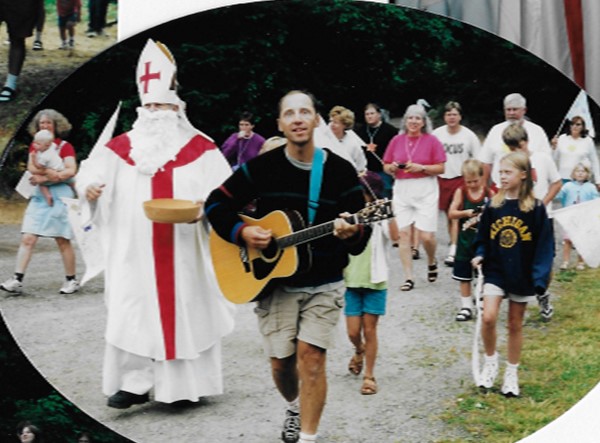
Last year we suggested that in observance of the Feast of the Presentation (February 2), the day we remember that Mary and Joseph presented Jesus to God in the temple, we too should present our children to God at Sunday worship.
Let’s do this with our kids and grandkids. Let’s have a grand procession into the church with all the children of the Church. Let them march in with balloons, streamers, and banners while playing horns, beating drums, and banging tambourines to “make a joyful noise unto the Lord” as did King David who entered Jerusalem in festive dance! Let the entire Mass be filled with exuberant joy as we present our children to God, the children who are not simply the future Church, but the Church now! Even as young ones, they are discovering how much they are loved by God and how much God wants to use them to bring God’s love to the world of their daily lives.
I wrote the Archbishop of Seattle in November suggesting that he encourage the pastors in the archdiocese to observe “Present the Children to God Sunday.” I have not yet heard back from him. Lori and I proposed this to our pastor, and he said, “Go for it!” Here’s the tentative plan.
Essay/poetry contest— In order to build some interest in this day among the young, we are going to host an essay/poetry contest with prize money. Topic: Care for the Earth (in response to Pope Francis’ encyclical letter Laudato Si – see https://www.youtube.com/watch?v=KOgF2Kgel6k for a 4-minute video for children.) Write a poem or a 100-word essay on what it means for you to “care for the earth” during this time of climate crisis.
First place: $25 Second Place: $15 Third place: $10
We are opening up this contest to our young readers. Scan and email your essay or poem – one entry per person – to Robert@catholiclifeministries.org. We will select winners for the following age groups: High School (9th – 12th grade); Middle School (6th – 8th grade); Primary School (Kinder – 5th grade). Please be sure to write the author’s name, grade level, and phone or email on the entry. Winners will receive a check in the mail!
Liturgy for Present the Children to God Sunday
¨ Children with banners and streamers process in at the beginning of Mass behind the Word of God. The choir sings “O When the Saints Come Marching In.” If possible, a trumpet player will lead the procession.
¨ With the opening prayer, the presider prays a prayer of thanksgiving for the gift of the children of the Church.
¨ Children who have been prepared serve as lectors and read the Scripture readings.
¨ The presider invites the children with the winning essays or poems to read them during the homily.
¨ Children who have been prepared lead the prayers of the faithful.
¨ During the Preparation of Gifts, children are invited to bring a dollar for the Children’s basket on the altar or a canned food item for St. Vincent de Paul.
¨ All the children present are invited around the altar as the presider begins the Liturgy of the Eucharist. The children are asked to return to their seats following the Our Father.
¨ As part of the final blessing, the presider invites the children to come forward as he gives each one a holy card from the parish (see below), commemorating the day and containing a short prayer the children are invited to pray daily.
¨ Cake and refreshments await the children and their families in the parish hall.
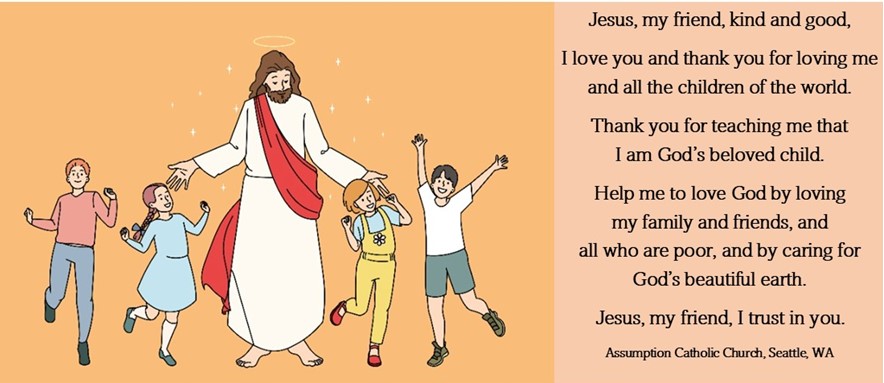
Pandemic, War in Ukraine, Drug Abuse, Refugees, and EASTER!
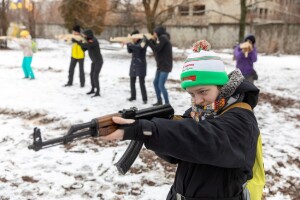 If you are suffering through any of these horrors or others that are painful and frightening, you might think that Jesus, the Kingdom of God, and Easter are not meant for you. You are living your Garden of Gethsemane, your Good Friday…and resurrected life and spirit-filled existence are a distant dream. But you would be mistaken! Because Easter and Pentecost happened over 2,000 years ago at a time quite similar to ours. Ordinary Jews, women and men of faith and their children, encountered the risen Jesus amid the terrors of Roman rule, the corruption of the religious elite and the wealthy, the ravages of disease and sickness, and the daily grind of work and struggle to make ends meet.
If you are suffering through any of these horrors or others that are painful and frightening, you might think that Jesus, the Kingdom of God, and Easter are not meant for you. You are living your Garden of Gethsemane, your Good Friday…and resurrected life and spirit-filled existence are a distant dream. But you would be mistaken! Because Easter and Pentecost happened over 2,000 years ago at a time quite similar to ours. Ordinary Jews, women and men of faith and their children, encountered the risen Jesus amid the terrors of Roman rule, the corruption of the religious elite and the wealthy, the ravages of disease and sickness, and the daily grind of work and struggle to make ends meet.
The Risen Jesus did not transform their circumstances, but he did change their hearts, helping them to live with hope in the midst of evil, corruption, sickness, and the demands of daily life. The Risen Jesus empowered them to make a difference within the circumstances of their lives, to be a power for good! The risen Jesus can do the same for you and me. This month we share with you the Stations of the Resurrection, a spiritual exercise designed to help you meet the risen Jesus as the did disciples. May Jesus reveal to you how deeply you are loved by God, and how you, too, can be a power for good within the circumstances of your life, however difficult those circumstances might be.
Easter JOY!
Robert & Lori
Stations of the Resurrection
Introduction: We walk the “Stations of the Resurrection” to remind us that Jesus, the Risen One, who revealed Himself to the disciples over two thousand years ago, is seeking to encounter us now within the ups and downs, joys and sorrows of our lives. Jesus will show Himself to any heart that will welcome Him, even a heart filled with doubt.
Station 1: Jesus Is Placed in a Tomb
L – We adore you, O Christ, and we love you.
All – Because by your death and resurrection you have set us free.
Joseph of Arimathea…went to Pilate and asked for the body of Jesus…he took him down, wrapped him in the linen cloth and laid him in a tomb that had been hewn out of the rock. Then he rolled a stone against the entrance to the tomb. Mary Magdalene and Mary the mother of Joses watched where he was laid. Mk 15:43-47
Response: Alleluia! Alleluia! Alleluia!
St. Therese, the Little Flower
L – We adore you, O Christ, and we love you.
All – Because by your death and resurrection you have set us free.
The women who had come from Galilee with him followed behind, and when they had seen the tomb and the way in which his body was laid in it, they returned and prepared spices and perfumed oils. Then they rested on the Sabbath according to the commandment. But at daybreak on the first day of the week they took the spices they had prepared and went to the tomb. They found the stone rolled away from the tomb; but when they entered, they did not find the body of the Lord Jesus. Luke 23:55-24:3
Response: Alleluia! Alleluia! Alleluia!
From the Saints: O living flame of love that tenderly wounds my soul in its deepest center… How gently and lovingly you wake in my heart, where in secret you dwell alone; and in your sweet breathing, filled with good and glory, how tenderly you swell my heart with love. St. John of the Cross
Station 3: Peter and the Empty Tomb
L – We adore you, O Christ, and we love you.
All – Because by your death and resurrection you have set us free.
The women were Mary Magdalene, Joanna, and Mary the mother of James; the others who accompanied them also told this to the apostles, but their story seemed like nonsense and they did not believe them. But Peter got up and ran to the tomb, bent down, and saw the burial cloths alone; then he went home amazed at what had happened. Luke 23:10-12
Response: Alleluia! Alleluia! Alleluia!
From the Saints: May you trust God that you are exactly where you are meant to be…May you use those gifts that you have received, and pass on the love that has been given to you. May you be content knowing that you are a child of God. Let this presence settle into our bones, and allow your soul the freedom to sing, dance, praise and love. It is there for each and every one of you. St Teresa of Avila
Station 4: Mary Magdalen and the Gardener
L – We adore you, O Christ, and we love you.
All – Because by your death and resurrection you have set us free.
Mary stayed outside the tomb weeping… she turned around and saw Jesus there, but did not know it was Jesus. Jesus said to her, “Woman, why are you weeping? Whom are you looking for?” She thought it was the gardener and said to him, “Sir, if you carried him away, tell me where you laid him, and I will take him.” Jesus said to her, “Mary!” She turned and said to him in Hebrew, “Rabbouni,” …Mary of Magdala went and announced to the disciples, “I have seen the Lord…” John 20:11-16
Response: Alleluia! Alleluia! Alleluia!
From the Saints: For we are so preciously loved by God that we cannot even comprehend it. No created being can ever know how much and how sweetly and tenderly God loves them. It is only with the help of his grace that we are able to perservere in spiritual contemplation with endless wonder at his high, surpassing, immeasurable love which our Lord in his goodness has for us.
St. Julian of Norwich
Station 5: The Road to Emmaus
L – We adore you, O Christ, and we love you.
All – Because by your death and resurrection you have set us free.
…two of them were going to a village seven miles from Jerusalem called Emmaus…Jesus himself drew near and walked with them, but their eyes were prevented from recognizing him. He asked them, “What are you discussing as you walk along?” …One of them, named Cleopas, said to him…, “Are you the only visitor to Jerusalem who does not know of the things that have taken place there in these days?…The things that happened to Jesus the Nazarene… how our chief priests and rulers both handed him over to a sentence of death and crucified him…Some women from our group…were at the tomb early in the morning and did not find his body; they came back and reported that they had indeed seen a vision of angels who announced that he was alive. Then some of those with us went to the tomb and found things just as the women had described, but him they did not see.” Luke 24:13-24
Response: Alleluia! Alleluia! Alleluia!
From the Saints: God commands us to love Him, not as much as He deserves, because He knows our capabilities and therefore He does not ask us to do what we cannot do. But He asks us to love Him according to our strength, with all our soul, all our mind, and all our heart. St. Padre Pio
Station 6: Breaking of the Bread
L – We adore you, O Christ, and we love you.
All – Because by your death and resurrection you have set us free.
[Jesus] said to them, “…Was it not necessary that the Messiah should suffer these things and enter into his glory?” …As they approached the village to which they were going…they urged him, “Stay with us, for it is nearly evening and the day is almost over.” So he went in to stay with them. And it happened that, while he was with them at table, he took bread, said the blessing, broke it, and gave it to them. With that their eyes were opened, and they recognized him, but he vanished from their sight. Luke 24:25-32
Response: Alleluia! Alleluia! Alleluia!
From the Saints: Jesus, thou joy of loving hearts, Thou fount of life, thou Light of men [and women], from the best bliss that earth imparts we turn unfilled to Thee again. We taste Thee, O Thou living Bread, and long to feast upon Thee still: We drink of Thee, the Fountainhead, and thirst our souls from Thee to fill. O Jesus, ever with us stay, make all our moments calm and bright; Chase the dark night of sin away, shed o’er the world Thy holy light.
St. Bernard of Clairvaux
Station 7: Hearts Burning Within
L – We adore you, O Christ, and we love you.
All – Because by your death and resurrection you have set us free.
Then they said to each other, “Were not our hearts burning [within us] while he spoke to us on the way and opened the scriptures to us?” So they set out at once and returned to Jerusalem where they found gathered together the eleven and those with them who were saying, “The Lord has truly been raised and has appeared to Simon!”
Luke 24:32-34
Response: Alleluia! Alleluia! Alleluia!
From the Saints: Jesus is my God. Jesus is my Spouse. Jesus is my Life. Jesus is my only Love. Jesus is my All in All. Jesus is my Everything. Jesus, I love with my whole heart, with my whole being. I have given Him all, even my sins and He has espoused me to Himself in tenderness and love. Now and for life I am the Spouse of my Crucified Spouse. Mother Teresa
Station 8: The Locked Room
L – We adore you, O Christ, and we love you.
All – Because by your death and resurrection you have set us free.
On the evening of that first day of the week, when the doors were locked, where the disciples were, for fear of the Jews, Jesus came and stood in their midst and said to them, “Peace be with you.” When he had said this, he showed them his hands and his side. The disciples rejoiced when they saw the Lord. [Jesus] said to them again, “Peace be with you. As the Father has sent me, so I send you.” And when he had said this, he breathed on them and said to them, “Receive the holy Spirit.” John 20:19-22
Response: Alleluia! Alleluia! Alleluia!
From the Saints:
Place your mind before the mirror of eternity! Place your soul in the brilliance of glory! And transform your entire being into the image of the Godhead Itself through contemplation. So that you too may feel what His friends feel as they taste the hidden sweetness which God Himself has reserved from the beginning for those who love Him. St. Clare of Assisi
Station 9: Doubting Thomas
L – We adore you, O Christ, and we love you.
All – Because by your death and resurrection you have set us free.
Thomas, called Didymus,…was not with them when Jesus came…he said to them, “Unless I see the mark of the nails in his hands and put my finger into the nail marks and put my hand into his side, I will not believe.” Now a week later his disciples were again inside and Thomas was with them. Jesus came, although the doors were locked, and stood in their midst and said, “Peace be with you.” Then he said to Thomas, “Put your finger here and see my hands, and bring your hand and put it into my side, and do not be unbelieving, but believe.” Thomas answered and said to him, “My Lord and my God!” John 20:24-28
Response: Alleluia! Alleluia! Alleluia!
From the Saints: Take, Lord, and receive all my liberty, my memory, my understanding, and my entire will, all I have and call my own. You have given all to me. To you, Lord, I return it. Everything is yours; do with it what you will. Give me only your love and your grace, that is enough for me.
St. Ignatius of Loyola
Station 10: The Beloved Disciple
L – We adore you, O Christ, and we love you.
All – Because by your death and resurrection you have set us free.
Together were Simon Peter, Thomas called Didymus, Nathanael from Cana in Galilee, Zebedee’s sons, and two others of his disciples. Simon Peter said to them, “I am going fishing.” They said to him, “We also will come with you.” So they went out and got into the boat, but that night they caught nothing. When it was already dawn, Jesus was standing on the shore; but the disciples did not realize that it was Jesus. Jesus said to them, “Children, have you caught anything to eat?” They answered him, “No.” So he said to them, “Cast the net over the right side of the boat and you will find something.” So they cast it, and were not able to pull it in because of the number of fish. So the disciple whom Jesus loved said to Peter, “It is the Lord.” John 21:1-7
Response: Alleluia! Alleluia! Alleluia!
From the Saints: Love transforms one into what one loves…To join two things together there must be nothing between them or there cannot be a perfect fusion. Now realize that this is how God wants our soul to be, without any selfish love of ourselves or of others in between, just as God loves us without anything in between.
St. Catherine of Siena
Station 11: Paul Meets Jesus
L – We adore you, O Christ, and we love you.
All – Because by your death and resurrection you have set us free.
…For you heard of my former way of life in Judaism, how I persecuted the church of God beyond measure and tried to destroy it… when [God], who from my mother’s womb had set me apart and called me through his grace, was pleased to reveal his Son to me so that I might proclaim him to the Gentiles…
Gal 1: 11-16
Response: Alleluia! Alleluia! Alleluia!
From the Saints: My Lord God, I have no idea where I am going. I do not see the road ahead of me. I cannot know for certain where it will end. Nor do I really know myself, and the fact that I think that I am following your will does not mean that I am actually doing so. But I believe that the desire to please you does in fact please you. And I hope I have that desire in all that I am doing. I hope that I will never do anything apart from that desire. Thomas Merton
Station 12: Peter, do you love me?
L – We adore you, O Christ, and we love you.
All – Because by your death and resurrection you have set us free.
When they had finished breakfast, Jesus said to Simon Peter, “Simon, son of John, do you love me more than these?” He said to him, “Yes, Lord, you know that I love you.” …He then said to him a second time, “Simon, son of John, do you love me?” He said to him, “Yes, Lord, you know that I love you.” …He said to him the third time, “Simon, son of John, do you love me?” Peter was distressed that he had said to him a third time, “Do you love me?” and he said to him, “Lord, you know everything; you know that I love you.”
Response: Alleluia! Alleluia! Alleluia!
Station 13: 500 Disciples See Jesus
L – We adore you, O Christ, and we love you.
All – Because by your death and resurrection you have set us free.
For I handed on to you as of first importance what I also received: that Christ…was raised on the third day in accordance with the scriptures; that he appeared to Cephas, then to the Twelve. After that, he appeared to more than five hundred brothers at once, most of whom are still living, though some have fallen asleep. After that he appeared to James, then to all the apostles. Last of all, as to one born abnormally, he appeared to me. For I am the least of the apostles, not fit to be called an apostle, because I persecuted the church of God. 1 Cor 15:3-9
Response: Alleluia! Alleluia! Alleluia!
/a>From the Saints: Our Lord very humbly revealed words to me…you will not be overcome…and these words: “you will not be overcome” were said very insistently and strongly, for certainty and strength against every tribulation which may come. He did not say: you will not be troubled, you will not be labored, you will not be disquieted; but he said, you will not be overcome. God wants us to pay attention to these words, and always to be strong in faithful trust, in well-being and in woe, for he loves us and delights in us, and so he wishes us to love him and delight in him and trust greatly in him, and all will be well… God, of your goodness give me yourself, for you are enough for me. St. Julian of Norwich
Closing Prayer
Antiphon: Alleluia! Alleluia! Alleluia!
Oh, good and loving God, Father of Jesus, give us the gift of faith that we might welcome the risen Jesus into our hearts.
Antiphon: Alleluia! Alleluia! Alleluia!
Jesus, beloved Son, crucified and risen, draw us into the Father’s love.
Antiphon: Alleluia! Alleluia! Alleluia!
Holy Spirit, living flame of love, empower us to bring the love of God to all we meet especially those who are poor and spiritually abandoned in any way.
All: We cannot love God unless we love each other, and to love we must know each other. We know Him in the breaking of bread, and we know each other in the breaking of bread, and we are not alone anymore. Heaven is a banquet and life is a banquet, too, even with a crust, where there is companionship. Dorothy Day
Glory be to the Father…
_________________
photo of Ukraine child ©palinchak/123RF.COM
